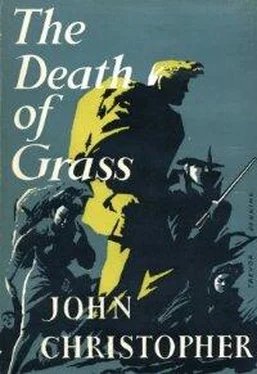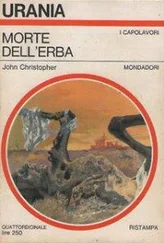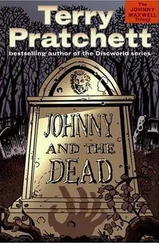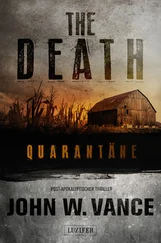He wrote:
There isn’t a blade of grass left in the valley. I killed the last of the cows yesterday—I understand that someone in London had the sense to arrange for an extension of refrigeration space during last winter, but it won’t be enough to cope with the beef that will be coming under the knife in the next few weeks. I’m salting mine. Even if things go right, it will be years before this country knows what meat is again—or milk, or cheese.
“And I wish I could believe that things are going to go right It’s not that I disbelieve this report—I know the reputation of the people who have signed it—but reports don’t seem to mean very much when I can look out and see black instead of green.
“Don’t forget you’re welcome any time you decide to pack your things up and come. I’m not really bothered about the valley. We can live on root crops and pork—I’m keeping the pigs going because they’re the only animals I know that might thrive on a diet of potatoes. We’ll manage very well here. It’s the land outside I’m worried about.”
John threw the letter across to Ann and went to look out of the window of the sitting-room. Ann frowned as she read it.
“He’s still taking it all terribly seriously, isn’t he?” she asked.
“Evidently.”
John looked out at what had been the lawn and was now a patch of brown earth speckled with occasional weeds. Already it had become familiar.
“You don’t think,” Ann said, “living up there with only the Hillens and the farm men… it’s a pity he never married.”
“He’s going off his rocker {60} 60 off his rocker: mad (slang)
, you mean? He’s not the only pessimist about the virus.”
“This bit at the end,” Ann said. She quoted:
“In a way, I think I feel it would be more right for the virus to win, anyway. For years now, we’ve treated the land as though it were a piggy-bank, to be raided. And the land, after all, is life itself.”
John said: “We’re cushioned—we never did see a great deal of grass, so not seeing any doesn’t make much difference. It’s bound to have a more striking effect in the country.”
“But it’s almost as though he wants the virus to win.”
“The countryman always has disliked and mistrusted the townsman. He sees him as a gaping mouth on top of a lazy body. I suppose most farmers would be happy enough to see the urban dweller take a small tumble. Only this tumble, if it were taken, would be anything but small. I don’t think David wants Chung-Li to beat us, though. He’s just got it on his mind.”
Ann was silent for a while. John looked round at her. She was staring at the blank screen of the television set, with David’s letter tightly held in one hand.
“It may be he’s getting a bit of a worriter {61} 61 worriter: worrier (dialect)
in his old age. Bachelor farmers often do.”
Ann said: “This idea—of Roger warning us if things go wrong so that we can all travel north—is it still on?”
John said curiously: “Yes, of course. Though it hardly seems pressing now.”
“Can we rely on him?”
“Don’t you think so? Even if he were willing to take chances with our lives, do you think he would with his own—and with Olivia’s, and Steve’s?”
“I suppose not. It’s just…”
“If there were going to be trouble, we shouldn’t need Roger’s warning, anyway. We should see it coming, a mile off.”
Ann said: “I was thinking about the children.”
They’ll be all right. Davey even likes the tinned hamburger the Americans are sending us.”
Ann smiled. “Yes, we’ve always got the tinned hamburger to fall back on, I suppose.”
They went down to the sea as usual with the Buckleys when the children came back for the summer half-term holiday. It was a strange journey through a land showing only the desolate bareness of virus-choked ground, interspersed with fields where the abandoned grain crops had been replaced by roots. But the roads themselves were as thronged with traffic, and it was as difficult as ever to find a not too crowded patch of coast.
The weather was warm, but the air was dark with clouds that continually threatened rain. They did not go far from the caravan.
Their halting-place was on a spur of high ground, looking down to the shingle, and giving a wide view of the Channel. Davey and Steve showed a great interest in the traffic on the sea; there was a fleet of small vessels a couple of miles off shore.
“Fishing smacks,” Roger explained. “To make up for the meat we haven’t got, because there isn’t any grass for the cows.”
“And rationed from Monday,” Olivia said. “Fancy—fish rationed!”
“It was about time,” Ann commented. The prices were getting ridiculous.”
The smooth mechanism of the British national economy continues to mesh {62} 62 mesh: engage
with silent efficiency,” Roger said. “They told us that we were different from the Asiatics, and by God they were right! The belt tightens notch by notch, and no one complains.”
“There wouldn’t be much point in complaining, would there?” Ann asked.
John said: “It’s rather different now that the ultimate prospects are fairly good. I don’t know how calm and collected we should be if they weren’t.”
Mary, who had been drying herself in the caravan after a bathe, looked out of the window at them.
“The fishcakes at school always used to be a tin of anchovies to twenty pounds of potatoes—now it’s more like a tin to two hundred pounds. What are the ultimate prospects of that, Daddy?”
“Potato-cakes,” John said, “and the empty tin circulating along the tables for you all to have a sniff. Very nourishing too.”
Davey said: “Well, I don’t see why they’ve rationed sweets. You don’t get sweets out of grass, do you?”
Too many people had started to fill up on them,” John told him. “You included. Now you’re confined to your own ration, and what Mary doesn’t get of your mother’s and mine. Contemplate your good fortune. You might be an orphan.”
“Well, how long’s the rationing going to go on?”
“A few years yet, so you’d better get used to it.”
“It’s a swindle,” Davey said, “—rationing, without even the excitement of there being a war on.”
The children went back to school, and for the rest life continued as usual. At one time, soon after they had made their pact, John had made a point of telephoning Roger whenever two or three days went by without their meeting, but now he did not bother.
Food rationing tightened gradually, but there was enough food to stay the actual pangs of hunger. There was news that in some other countries similarly situated, food riots had taken place, notably in the countries bordering the Mediterranean. London reacted smugly to this, contrasting that indiscipline with its own patient and orderly queues for goods in short supply.
“Yet again,” a correspondent wrote to the Daily Telegraph, “ it falls to the British peoples to set an example to the world in the staunch and steadfast bearing of their misfortunes. Things may grow darker yet, but that patience and fortitude is something we know will not fail.”
John had gone down to the site of their new building, which was rising on the edge of the City. Trouble had developed on the tower-crane, and everything was held up as a result. His presence was not strictly required, but he had been responsible for the selection of a crane, which was of a type they had not used previously, and he wanted to be on the spot.
He was actually in the cabin of the crane, looking down into the building’s foundations, when he saw Roger waving to him from the ground. He waved back, and Roger’s gestures changed to a beckoning that even from that height could be recognized as imperative.
Читать дальше












